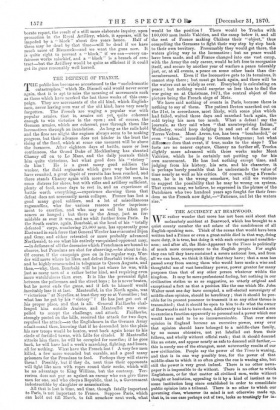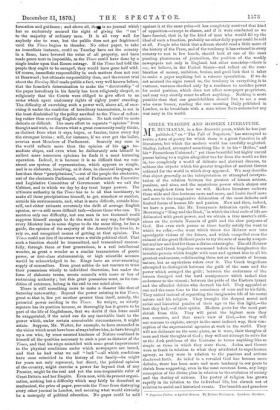THE ACCIDENT AT BEARWOOD.
WE rather wonder that more has not been said about that melancholy accident at Bearwood, which has brought to a quiet county member the sad solace of the condolences of all English-speaking men. Think of the reams that would have been written had a Prince or even a great noble died in that way, doing mere duty, it is true, but doing it with such courage and unselfish- ness; and after all, the Heir-Apparent to the Times is politically of much more consequence to the English people. For aught they can tell they have sustained a severe national loss, and from all we can hear, we think it likely that they have ; that a man has passed away from among them who would have made a wise and thoughtful use of vast hereditary power, power greater for many purposes than that of any other person whatever within the kingdom. It may be mere professional feeling, but nothing in our civilization strikes us as so suggestive, so utterly original and exceptional a fact as that a position like the one which Mr. John Walter must one day have occupied, a self-elected sovereignty of middle-class opinion, should be hereditary ; that it should be pos- sible for its present possessor to transmit it as any other throne is transmitted ; that it should be open to him to do what the owner of Bearwood is said to have done, deliberately to have trained a son to exercise a function apparently so personal and a power which one would have said to be so incommunicable. That ever since opinion in England became an executive power, sway over that opinion should have belonged to a middle-class family, by no means obtrusive, not yet labelled out from their fellows, and wholly without official rank ; that it should descend like an estate, and appear nearly DA safe to descend still further,— this is surely one of the strangest, most noteworthy results of our new civilization. People say the power of the Times is waning, and that is in one way possibly true, for the power of that middle-class to which it so often gives the cue is waning also, but still the power is very great indeed. There is no other news- paper it is impossible to do without. There is no other to which Englishmen, or for that matter all civilized men, write without thought or hesitation, appealing to it by a kind of instinct as to some institution long since established in order to consolidate public opinion into a tribunal. There is no other to which our governing class, whenever its mind is not otherwise made up, that is, in one case perhaps out of two, looks so trustingly for in-
formation and guidance ; and above all, this no journal which has so exclusively secured the right of giving the " cue "
to the majority of ordinary men. It is all very well for anybody else to roar, but the public does not get frightened until the Times begins to thunder. No other paper, to take an immediate instance, could on Tuesday have set the country in a flame, have lowered the value of all property, and have made peace next to impossible, as the Times could have done by a single leader upon that Rouen outrage. If the Times had told the people they ought to be enraged, they would have gone half wild. Of course, immediate responsibility in such matters does not rest at Bearwood ; but ultimate responsibility does, and the recent trial about the Evening Mail made public a fact, very well known before, that the founder's determination to make the "dictatorship " of the paper hereditary in his family has been religiously obeyed, so religiously that the Courts were obliged to give effect to an order which upset customary rights of eighty years' standing. The difficulty of exercising such a power well, above all, of exer- cising it under the condition of hereditary transmission, is not in the least diminished by the policy ascribed to the Times of reflect- ing rather than creating English opinion. No task could be more delicate or difficult. The mere effort to separate " opinion" from thought and wish, to discern what a great community really thinks, as distinct from what it says, hopes, or fancies, taxes every day the strongest brains ; will, for instance, if we ever get the ballot, overtax most Members of Parliament. Scarcely any man in the world reflects more than the opinion of his gen im- mediate clique, and even when he deliberately seta himself to collect more numerous opinions he finds it a most harassing operation. Indeed, it is because it is so difficult that we con- struct our system of representation, which appears so simple, and is so elaborate, involving, as it does, in chemical language, no less than three "precipitations,"—out of the people the electorate, out of the electorate Parliament, out of Parliament the Executive and Legislative Committee of Government which we call the Cabinet, and to which we day by day trust larger powers. The ultimate authority in the Times has to be all that machinery, to make all those precipitations himself, to get, somehow or another, outside his environments, and, what is more difficult, outside him- self, and either estimate accurately the drift of average English opinion, or—a still more difficult task—choose those who can. To mention only one difficulty, not one man in ten thousand could suppress himself enough to do the work in any way, for though every Minister has in some degree to do the same thing, he has a guide, the opinion of the majority of the Assembly he lives in, to rely on, and recognized means of getting at that opinion. The Times could not live if its owner were a visible political chief. That such a function should be transmitted, and transmitted success- fully, through three or four generations, is a real intellectual wonder, as great a wonder as a similar transmission of poetic power, or first-class statesmanship, or high scientific acumen would be acknowledged to be. Kings have an ever-renewing supply of counsellors. Even great nobles do not venture to trust their possessions wholly to individual discretion, but under the form of elaborate trusts, create councils with more or less of restraining authority ; but this great possession must, as its con- dition of existence, belong in the end to one mind alone.
There is still something more to make a disaster like that of Saturday noteworthy. Beyond the power existing in the Times, great as that is, lies yet another greater than itself, namely, the potential power residing in the Times. So unique, so utterly separate has its position become, so thoroughly has it grown to be part of the life of Englishmen, that we doubt if this force could be exaggerated, if the mind can fix any inevitable limit to the power which, under certain conceivable circumstances, it might attain. Suppose, Mr. Walter, for example, to have succeeded in the vision which must have been always before him, to have brought up a son who, by some unusual kindness of Nature combined in himself all the qualities necessary to such a post as dictator of the Times, and that his reign coincided with some great improvement in the physical conditions under which newspapers are issued, and that he had what we call "luck "—all which conditions have once coincided in the history of the family—he might for years not only represent, but direct, the political opinion of the country, might exercise a power far beyond that of any Premier, might be the real and yet the non-responsible ruler of Great Britain and her Empire. Even now, with its present organi- zation, nothing but a difficulty which may fairly be described as mechanical, the price of paper, prevents the Times from destroying every other journal in London, and securing what would virtually be a monopoly of political education. No paper could be sold against it at the same price—it has completely survived that kind of opposition—except to classes, and if it were conducted as we have fancied, that is, by the kind of man who would fill up the ideal of such a function, probably no other daily paper could be sold. at all. People who think that a dream should read a little more of the history of the Press, and of the tendency it has evinced in every country to rest in few hands, should look at one of the most puzzling phenomena of journalism, the position of the weekly newspapers not only in England, but other countries—there is one, we believe, in the United States—and reflect on the com- bination of money, ambition, brains, and good luck that it takes to make a paper anything but a ruinous speculation. If we do not misread the signs round us, the tendency in everything is to vastness, vastness checked only by a readiness to sacrifice power for social position, which does not affect newspaper proprietors, and may very shortly cease to affect anything. Nothing is more possible than that our grandchildren should live to see a man who owns Sussex, reading the one morning Daily published in London, as he breakfasts with a man whose fleets outnumber any war navy in the world.



































 Previous page
Previous page